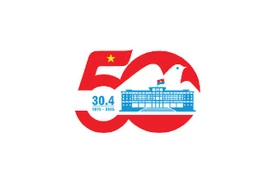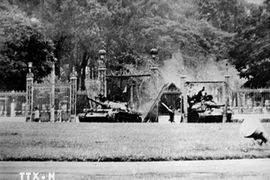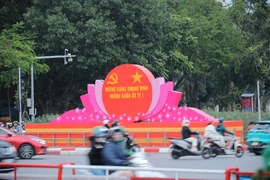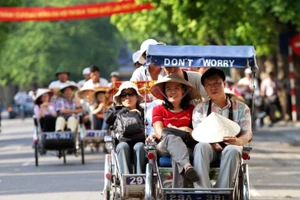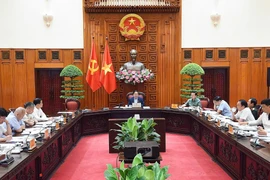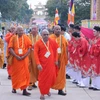Berlin (VNA) – Veteran German journalist and historian Gerhard Feldbauer, in an interview with the Vietnam News Agency (VNA)'s resident correspondents in Berlin on the occasion of the 50th anniversary of Vietnam’s reunification (April 30, 1975 – 2025), shared his views on the historic significance of Vietnam’s victory and its far-reaching global impact.
Feldbauer, who served as the Hanoi-based correspondent for the German Democratic Republic’s ADN news agency from 1967 to 1970, highlighted that the ultimate success of the Ho Chi Minh campaign in April 1975 was rooted in the unyielding revolutionary will of the Vietnamese people. This resolve, he said, stemmed from a long tradition of anti-colonial resistance under the leadership of the Communist Party of Vietnam (CPV) and President Ho Chi Minh.
He also highlighted the crucial support from the socialist bloc, particularly the provision of modern weaponry by the former Soviet Union, and the international solidarity of peace movements and peoples across the world, including in the US.
According to Feldbauer, the Vietnamese revolution played a decisive role in inspiring national liberation struggles throughout Asia, Africa, and Latin America, with experiences drawn from it continuing to offer valuable lessons in the country’s application of Marxism-Leninism.
Touching on Vietnam’s policy of national unity and reconciliation, Feldbauer noted the spirit of national solidarity and people’s broad-based support during the liberation struggle and cited the humane conduct of the Vietnam People’s Army during the liberation of Sai Gon. He also recalled that General Duong Van Minh, the last President of the Republic of Vietnam, was allowed to return to his residence and live there until 1981.
Feldbauer praised the establishment of diplomatic relations between Vietnam and the US in 1995 as well as the exchange of visits by US veterans and senior leaders from both countries. He also highlighted then US President Barack Obama’s decision to lift the arms embargo and his commitment to supporting Vietnam in addressing Agent Orange contamination.
Regarding the changes in Vietnam over the 50 years since reunification, Feldbauer observed that the country had undergone a profound transformation, particularly since the 6th National Party Congress in 1986. This marked the launch of the Doi moi (renewal) policy, which introduced multi-sector economic and market-oriented financial policies.
He stressed that Vietnam had risen from an economically underdeveloped nation to become one of the most dynamic economies in the world, achieving impressive growth rates and substantial improvements in per capita income and living standards.
Feldbauer paid particular tribute to late Party General Secretary Nguyen Phu Trong for his contributions to analysing Vietnam’s development path. He also noted that Vietnam has consistently and firmly rejected any attempts to undermine its economic sovereignty, viewing this as a vital safeguard for its continued success on the path to socialism under the CPV's leadership.
When asked how the legacy of the liberation struggle translates into today’s digital economy and industrial revolution, Feldbauer held that while many Southeast Asian countries following a capitalist model have faced growth challenges, Vietnam achieved impressive economic performance in 2024. He considered the country’s four-pillared strategy a vital driver of future progress.
He also pointed to Vietnam’s efforts to attract foreign investment into the semiconductor sector, including the creation of a national steering committee and partnerships with leading global technology firms.
Feldbauer assessed that the country’s open and outward-looking foreign policy, which prioritises partnership and cooperation, is a key factor in today’s complex international situation. In particular, he took note of Vietnam’s comprehensive strategic cooperative partnership with China and traditional friendship with Russia.
The journalist holds a doctorate in Vietnamese history and has authored four books and numerous articles on the subject./.

See more
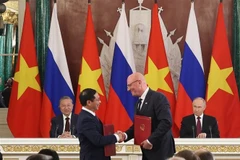
Vietnamese, Russian leaders witness signing of numerous bilateral cooperation agreements
General Secretary of the Communist Party of Vietnam Central Committee To Lam and Russian President Vladimir Putin witnessed the signing of a series of cooperation documents between the two nations, immediately following their talks in Moscow in the afternoon of May 10.
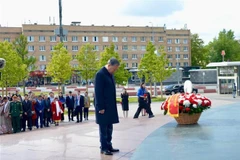
Party chief pays tribute to President Ho Chi Minh, General Secretary Le Duan in Moscow
The statue of President Ho Chi Minh is located in the square spanning an area of 676 sq.m with three landings and eight steps symbolising eight lotus petals.
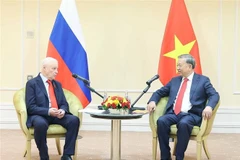
General Secretary To Lam meets with Russian Party leader
General Secretary To Lam affirmed that the foreign policies of independence and self-reliance of Vietnam and Russia are an important pillar, and its cooperation with Russia, including collaboration via the Party channel, is significant to Vietnam's development in the new era.
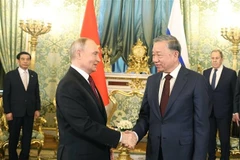
Vietnamese Party chief holds talks with Russian President in Moscow
President Putin affirmed that the Russia-Vietnam relationship has stood the test of time over the past 75 years since the establishment of relations, and the two countries have stood side by side not only during the war but also in the current period of peace.
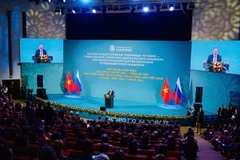
Party leader stresses promoting Vietnam – Russia traditional friendship in new era
Vietnam and Russia share great similarities in history, spirit, vision, and value. Few countries in the world win such steadfast and deep affection from generations of Vietnamese people like the Soviet Union in the past and Russia at present, said Party General Secretary To Lam.
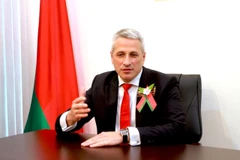
Party chief’s state visit to inject momentum into Vietnam – Belarus ties: Ambassador
The Vietnamese Party leader’s visit to Belarus holds great significance, expected to open up a new chapter in the bilateral relations, which were built on friendship, trust, assistance and mutual understanding, said Belarusian Ambassador to Vietnam Uladzimir Baravikou.
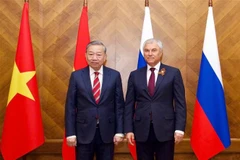
State Duma of Russia committed to boosting cooperation with Vietnam: Russian leader
The Party, State, and people of Vietnam always treasure and remember the valuable support from the former Soviet Union and the Russian Federation today for Vietnam's struggle for national liberation in the past as well as national development efforts at present.
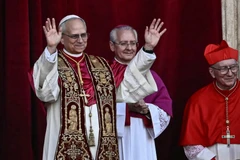
Vietnam sends congratulations to new Pope Leo XIV
State President Luong Cuong on May 10 sent a message of congratulations to Cardinal Robert Francis Prevost on being elected as the 267th Pope of the Roman Catholic Church.
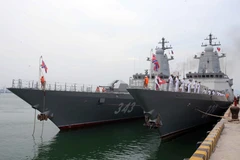
Russian naval fleet makes port call in Da Nang city
During their stay in Da Nang, the Russian naval officers and sailors will engage in various activities, including laying wreaths at the Da Nang Heroes and Martyrs Memorial, paying courtesy calls to leaders of the municipal People’s Committee, the Naval Region 3 Command, and the Military Region 5 Command.
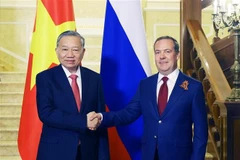
CPV – URP ties serve as solid foundation for Vietnam – Russia relations: General Secretary
General Secretary of the Communist Party of Vietnam (CPV) To Lam and Dmitry Medvedev, Chairman of the United Russia Party (URP) and Deputy Chairman of the Security Council of Russia, affirmed their commitment to further consolidating political trust through high-level exchanges and close cooperation between the CPV and the URP, laying the cornerstone for long-term and sustainable relations.
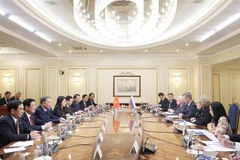
Vietnamese Party leader meets with Speaker of Russian Federation Council
Party General Secretary To Lam highly valued the Russian Federation Council’s role in promoting bilateral cooperation, calling on the two sides to keep strengthening parliamentary cooperation to practically contribute to the fruitful implementation of bilateral agreements.
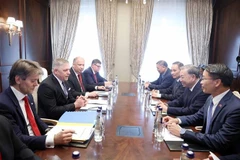
Party chief meets foreign leaders in Moscow
General Secretary of the Communist Party of Vietnam Central Committee To Lam held bilateral meetings with foreign leaders in Russia on May 8 and 9.
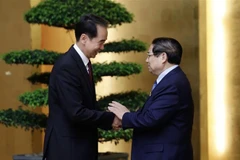
Prime Minister hosts Chinese Ambassador to Vietnam
Prime Minister Pham Minh Chinh hosted a reception in Hanoi on May 8 for Chinese Ambassador to Vietnam He Wei.
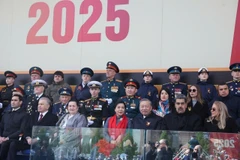
Party leader attends military parade celebrating Victory of Great Patriotic War in Moscow
Russian President Vladimir Putin, who is Supreme Commander-in-Chief of the Armed Forces of the Russian Federation, underlined that May 9 is a major holiday for every Russian family and for all nations that fought against fascism. He paid tribute to the immense sacrifices of tens of millions of soldiers and civilians whose contributions on both the front lines and in the rear paved the way for the victory.

☕ Afternoon briefing on May 9
A Government meeting on expediting the reorganisation of administrative units, the Ministry of Agriculture and Environment's opposition to China’s seasonal fishing ban in certain areas of the East Sea, and the opening of IRONMAN 70.3 Vietnam 2025 are among news highlights on May 9.
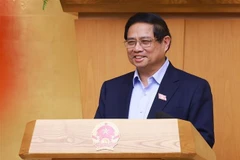
PM urges swift allocation of funds to compensate personnel affected by administrative restructuring
Vietnam's apparatus streamlining is estimated to save the state budget around 190.5 trillion VND (approx. 7.33 billion USD) in salary and administrative costs between 2026 and 2030.
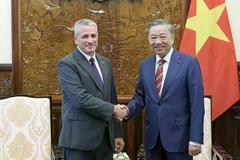
Party leader’s visit expected to boost friendship, cooperation with Belarus
This is Lam's first visit to Belarus in his capacity as the Party General Secretary and marks the first trip by a Vietnamese Party chief to the Eastern European nation in 11 years.
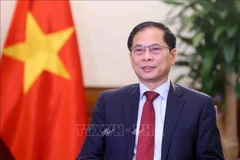
Vietnamese Deputy PM, FM meets with Azerbaijani FM
The Azerbaijani FM expressed his confidence that elevating the bilateral ties to a Strategic Partnership will unlock new opportunities for cooperation across various fields
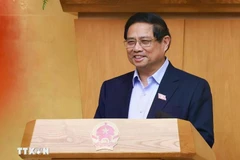
Prime Minister chairs meeting on reorganisation of administrative units
PM Chinh underscored that as part of efforts to implement the ongoing "revolution" in restructuring the political system’s organisational apparatus, ministries, agencies, and organisations at the central level have largely completed the reorganisation of their structures.
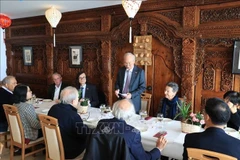
Swiss Party of Labour delighted with Vietnam's development achievements
Alexander Eniline, Chairman of the Swiss Party of Labour, expressed his delight at Vietnam's achievements in building socialism and voiced his confidence that the Southeast Asian nation will attain even greater success in the future.
